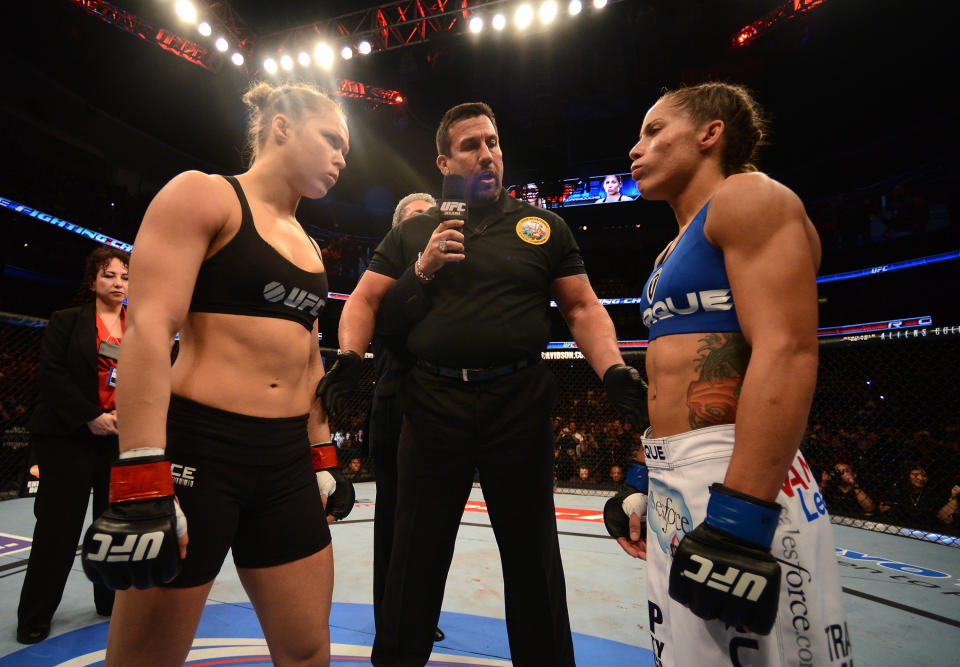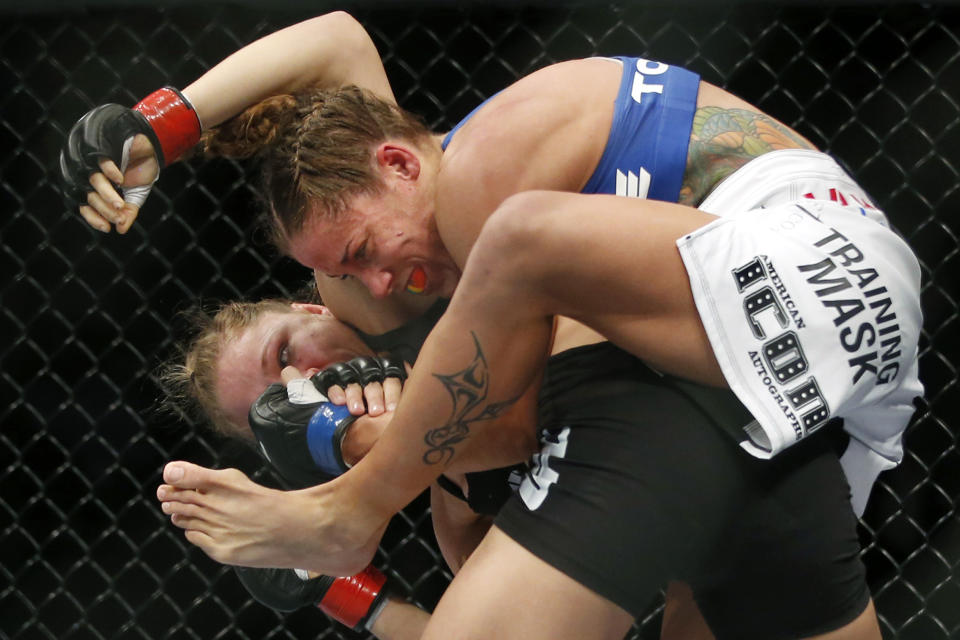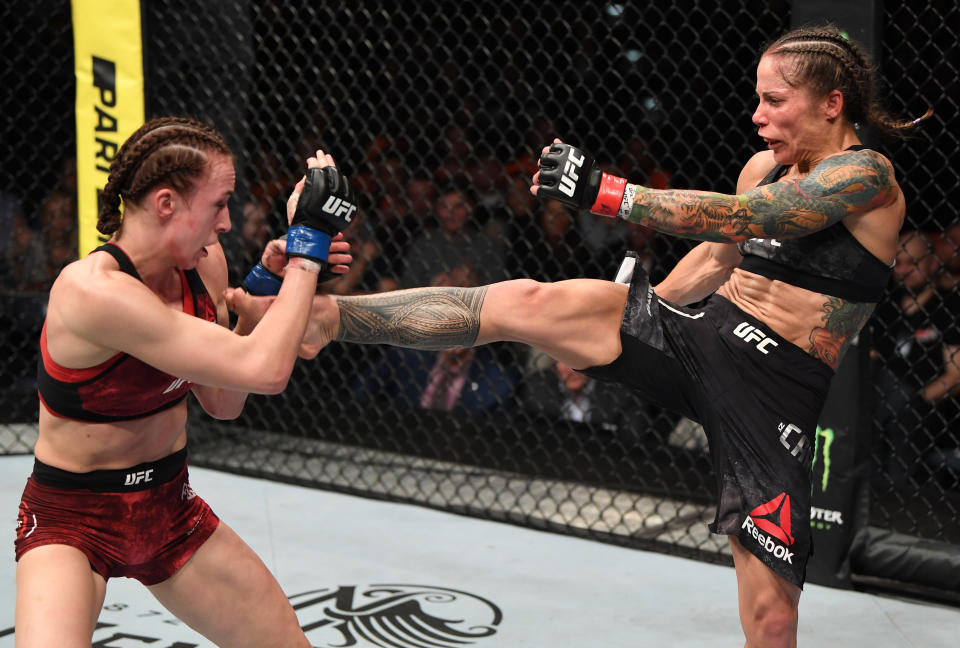Liz Carmouche finally getting another title shot 6 years after historic fight vs. Ronda Rousey

It’s been more than six years between UFC title shots for Liz Carmouche. Then as now, she fought a seemingly invincible and popular opponent who was an overwhelming favorite.
But Carmouche is far more equipped to deal with the challenges of fighting Valentina Shevchenko on Saturday (8 p.m. ET, ESPN+) for the UFC flyweight title in Montevideo, Uruguay, as a result of her history-making bout in 2013 with then-UFC bantamweight champion Ronda Rousey.
The future of women’s fighting quite literally hung in the balance when Rousey and Carmouche became the first women to not only headline a UFC card but to fight in the promotion.
There no doubt would be women’s fighting even without that show. It almost certainly wouldn’t be as popular, however, nor would the athletes be able to make a living exclusively from fighting.
When Carmouche turned pro in 2010, conditions were largely atrocious for women. She weighed 135 for her pro debut against Trudie Ginn on March 13, 2010, in Tijuana, Mexico. Ginn weighed 165 on the scale and, as Carmouche said, “who knows what she weighed” in the cage after she rehydrated following the weigh-in.
Carmouche was a flyweight even then but was fighting up in weight. She weighed the same in the cage as she did at the weigh-in. For that, she earned show money of $100 and earned a $100 bonus for winning the fight with a body kick.
“I was paying to be able to fight,” she said. “Everything I got, which wasn’t a lot, went to pay my expenses. I wasn’t fighting because I thought I’d get rich or because it was a viable career path. Like most of the women then, I was fighting because I loved it.”

She said it wasn’t until “a couple of years ago in the UFC” that she felt she could survive just on her earnings as a fighter. While she did well financially in her bout with Rousey, she viewed it as more of a one-off because of the outsized nature of that match.
That PPV sold 450,000 buys, proving that fans would pay to see women fight. UFC president Dana White loved the fight and that, more than anything else, helped propel the women’s game forward.
Carmouche credits Rousey as ‘game-changer’ for women’s MMA
There are women’s pro boxers, Heather Hardy chief among them, who are going to MMA because they feel like they can’t make a decent living boxing.
The Rousey-Carmouche bout did much to change that. And while even Carmouche credits Rousey greatly for spurring the growth of women’s MMA, the fact that Carmouche helped make it a compelling fight and at one point was close to a submission made it all the more of a must-see product going forward.
“You have to give credit to Ronda for what happened because without her, I don’t think any of it would have happened,” Carmouche said. “She went out there and did every interview and she was on TV and she did movies and she talked about this sport and women’s fighting over and over and she forced people to pay attention. She was a game-changer.
“I think our fight, the performance we put on, kind of sealed the deal. People liked what they saw and they saw that women could deliver the same way the men could.”
Having gone through that experience has helped Carmouche relax as she prepares to face Shevchenko, one of the most dominant fighters, male or female, in the world at this stage.
She understands what it takes to compete at the highest level and she’s not surprised by the pre-fight media obligations she faces. But nothing will ever be quite like that first one, she admits.
“The build-up to that fight was extraordinary,” Carmouche said of UFC 157. “It was a history-making moment. There was a lot invested into that fight. All the experiences I had, the stress, trying to juggle everything, there has never been anything close to it. So that fight has helped better prepare me for every single fight I’ve come to since.
“This one by comparison is night and day different. Not in terms of who I’m fighting, because Valentina is an awesome fighter. But we’re not carrying all the weight of the hopes and dreams of women’s fighters on our backs in this one, but sometimes, it felt that way [in the Rousey fight].”

Carmouche ready to claim first title in rematch vs. Shevchenko
The bout with Shevchenko will be Carmouche’s fourth at flyweight — she’s 2-1 in the division, with a split-decision loss to Alexis Davis followed by unanimous decision victories over Jennifer Maia and Lucie Pudilova — and her second of 2019.
It’s the first year since 2013, when she fought Rousey on Feb. 23, Jessica Andrade on July 27 and Davis on Nov. 6, that she’s fought more than once in a year.
She feels as ready as she can be to claim her first title, after coming up short at bantamweight in Strikeforce and against Rousey at UFC 157. She beat Shevchenko in a fight in 2010 when Carmouche cut Shevchenko with an upkick early in the fight.
She’s had a full camp and the aid of a quality team, which is more than she could say in the days when she first turned pro. It’s not as if it was the Dark Ages in 2010, but it was in many ways for female MMA fighters.
“When I decided I wanted to fight, one biggest issue was just trying to find a gym where I could train,” she said. “At that time, a lot of gyms wouldn’t allow women to train there at all. That’s been a huge thing, because now you see them everywhere. There are very few gyms you can go to now where they don’t accept female fighters. Back then, to find a gym that accepted you as a woman and then which would accept you as an out woman, was impossible. They didn’t exist, except the one I’m at. That’s a huge difference.
“And to be able to book fights, there weren’t that many opportunities, especially where they would book women. And if you found a show that would book a woman, you’d have to accept that it would be open weight classes. I had fights where they changed the opponent four times on me the day of [the event]. From there to now, it’s so different it’s hard to make people understand how far we’ve come.”
If she manages to overcome the massive odds against her -- Shevchenko is better than a 10-1 favorite -- she’ll have a lot more big events ahead of her.
Nothing, though, will ever match the excitement, the pressure and the drama that surrounded her bout with Rousey at UFC 157.
More from Yahoo Sports:


